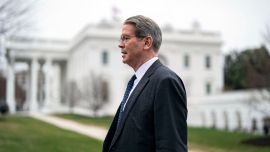Argentina’s government found itself gripped by another bout of political and financial instability on Tuesday as a key advisor to President Alberto Fernández resigned his post after less than three months in office.
Antonio Aracre, the president’s chief advisor and the former CEO of the Syngenta agricultural firm, announced on Twitter that he was stepping down in a bid to “deactivate any operation tending to unsettle the markets.”
News of the official’s departure came amid rumours of Economy Minister Sergio Massa’s departure from government, with Aracre reportedly in line to replace him at the head of the portfolio.
The unofficial ‘blue dollar’ exchange rate surged to an all-time high of 418 pesos per greenback on parallel markets in response to the reports and wider economic instability.
Argentina, which will elect a new president in October, is facing a punishing drought that has slashed billions of dollars off GDP and consumer prices have increased more than 104 percent over the last 12 months. Analysts say Argentines are looking for safety in the dollar given soaring inflation and falling purchasing power.
"As a result of the rumours that have been circulating since last night and in order to deactivate any operation tending to unsettle the markets, I have submitted my resignation as chief of advisors to the president immediately," said Aracre, ending a short spell in office that only began on February 1 and seeking to put the rumours to bed.
Fernández responded warmly to his outgoing chief advisor, who ended a three-decade career with Syngenta, including 12 years leading its business in Latin America, to join the government.
"Thank you dear friend for your valuable participation in our government. I know that we both dream of a fairer country and we will continue working to achieve it," said the president.
Massa on way out?
Despite the praise, government sources say not many outside the president’s inner circle will mourn Aracre’s departure. Even prior to taking office as chief advisor, the former business leader is said to have created unrest with remarks about the government’s economic programme.
Massa and Aracre had a good relationship prior to this year, with the latter once describing the ex-Tigre mayor as a “great facilitator who brings the private world closer to the public,” though sources inside the government say the relationship has since cooled.
Reports of Massa’s alleged impending departure began on Monday, with several journalists – among them La Nación journalist Carlos Pagni – suggesting that the Frente Renovador leader was on his way out.
"Is Massa going to want to continue as economy minister in this government or will he want to leave? In Government House there are people who say, 'Aracre is warming up,'" wrote Pagni.
Pagina/12 journalist Leandro Renou, quoting “very high sources in the Casa Rosada,” also said that Aracre was set to replace Massa.
Responding directly to the journalist on Twitter, Presidential Spokesperson Gabriela Cerruti indirectly denied the claim, saying the Casa Rosada “neither leaks nor denies journalistic inventions.”
Arrival and departure
News of Aracre’s arrival to Fernández’s Cabinet as chief advisor were first trailed in January, though he only assumed his post on February 1.
He replaced Julián Leunda, who resigned amid controversy after his name was linked to the so-called ‘Lago Escondido’ scandal, which involved a trip taken by judges, officials and businessmen to a ranch in the south of Argentina owned by billionaire businessman Joe Lewis.
Openly gay and seen as a rare LGBT+ voice among business leaders, Aracre was the third chief advisor to serve under the president. Juan Manuel Olmos was the first.
Aracre was reportedly the author of the so-called ‘soy dollar’ policy, in which agricultural producers are offered a preferential exchange rate for a short spell in order to boost exports and, in turn, Central Bank reserves.
According to Perfil, the ex-Syngenta CEO pitched the policy initially to the Treasury when Silvina Batakis was the head of the economy portfolio, though the then-minister remained unconvinced.
Aracre was seen as a business-friendly voice in the administration and his presence within the government was criticised by some sectors of the ruling coalition, including Kirchernerites such as Alicia Castro.
– TIMES/NA/PERFIL
























Comments